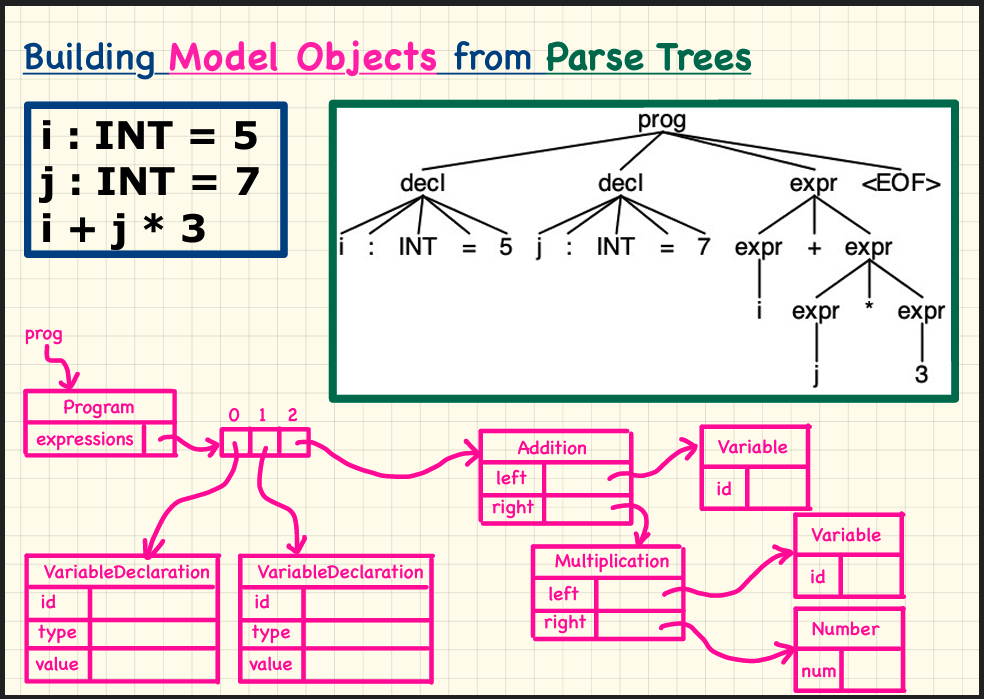❯ java -jar build/libs/AntlrProject-all-1.0-SNAPSHOT.jar testCases/test3.txt
Main Class of Antlr.libs/AntlrProject-all-1.0-SNAPSHOT.jar testCases/test3.txt
i is 5
j is 7
i + j is 12
i + j * 3 is 26
i + j + 3 is 15
10 is 10
-
Download Antlr-4.12.0 jar file from antlr.org
-
Move downloaded
jarto/usr/local/lib -
Add configs to my
.zshrcas following# ANTLR4 alias antlr4='java -jar /usr/local/lib/antlr-4.12.0-complete.jar' export CLASSPATH="/usr/local/lib/antlr-4.12.0-complete.jar:$CLASSPATH" alias grun='java org.antlr.v4.gui.TestRig' -
Verification Installation
❯ grun java org.antlr.v4.gui.TestRig GrammarName startRuleName [-tokens] [-tree] [-gui] [-ps file.ps] [-encoding encodingname] [-trace] [-diagnostics] [-SLL] [input-filename(s)] Use startRuleName='tokens' if GrammarName is a lexer grammar. Omitting input-filename makes rig read from stdin. ❯ ❯ antlr4 ANTLR Parser Generator Version 4.12.0 -o ___ specify output directory where all output is generated -lib ___ specify location of grammars, tokens files -atn generate rule augmented transition network diagrams -encoding ___ specify grammar file encoding; e.g., euc-jp -message-format ___ specify output style for messages in antlr, gnu, vs2005 -long-messages show exception details when available for errors and warnings -listener generate parse tree listener (default) -no-listener don't generate parse tree listener -visitor generate parse tree visitor -no-visitor don't generate parse tree visitor (default) -package ___ specify a package/namespace for the generated code -depend generate file dependencies -D<option>=value set/override a grammar-level option -Werror treat warnings as errors -XdbgST launch StringTemplate visualizer on generated code -XdbgSTWait wait for STViz to close before continuing -Xforce-atn use the ATN simulator for all predictions -Xlog dump lots of logging info to antlr-timestamp.log -Xexact-output-dir all output goes into -o dir regardless of paths/package
-
Add
AntlrPlugin to IntelliJ- Identify
.g4files and can preview parse Tree for given input
- Identify
-
Add
Antlrdependencies for the Java Projecthttps://docs.gradle.org/current/userguide/antlr_plugin.html
plugins { id 'antlr' } dependencies { antlr 'org.antlr:antlr4:4.12.0' // use antlr version 4. } generateGrammarSource { maxHeapSize = "64m" arguments += ["-visitor"] // Add visitor classes outputDirectory = file('src/main/java/com/neil3d2y/antlr/generated') }
-
.g4to define grammar -
ANTLR command line tool read
.g4and generates(-visitor)
Parser.javaLexer.java- Visitor classes
Another Way: (-no-visitor)
Parser.javaLexer.java
Third Way:
Parser.javaLexer.java- Listeners for GUI apps
-
My Own Java Classes use above generated Classes
NumberVariableMultiplicationAddition
WHY do we need to define these models classes instead of manipulating the parse tree generated by Antlr?
To have 100% control on the AST.
- Every internal node of parse tree (
expr,decl) should correspond to a Model Class.
| Parse Tree Internal Node | Model Class |
|---|---|
decl |
VariableDeclaration.class |
expr (+) |
Addition.class |
expr (*) |
Multiplication.class |
-
We use visitor pattern here
For each Model Class we will also have one corresponding Visitor Class / Function that converts the internal node to the Model Class.
- Behavioral Design pattern
- Use when we have to perform an operation on a group of similar kind of objects.
https://pediaa.com/what-is-the-difference-between-lex-and-yacc/
What is the diff between Yacc and Lex
The main difference between Lex and Yacc is that Lex is a lexical analyzer which converts the source program into meaningful tokens while Yacc is a parser that generates a parse tree from the tokens generated by Lex.
